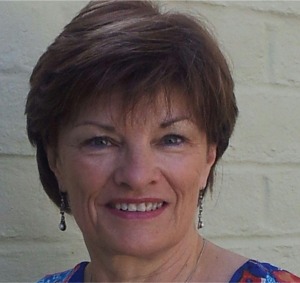Interview With Dr. Shelley Gray of Arizona State University

Shelley Gray is a professor of speech and hearing science in the College of Health Solutions at Arizona State University and a certified speech-language pathologist. She is also an affiliate faculty member in the Mary Lou Fulton Teachers College and a Barrett Honors Faculty member. She leads the Child Language and Literacy Lab (CHILLL) that focuses on the development of early literacy, reading, and working memory in children and adolescents and the development and testing of assessments and curricula to improve children’s learning and academic success. In collaboration with many talented colleagues, CHILLL has ongoing studies investigating the development and testing of the Teaching Early Literacy and Language (TELL) preschool curriculum, testing of the Comprehensive Assessment Battery for Children – Working Memory (CABC-WM), and longitudinal studies of reading and working memory in elementary through high school students.
Note: You should consult with your doctor or speech pathologist for recommendations on treatment. The views and opinions expressed in this article are those of Dr. Gray and do not necessarily reflect the official policy or position of SpeechPathologyMastersPrograms.com
How did you become interested in researching child language and literacy?
I completed my master’s degree in Speech and Hearing Science at the University of Arizona and completed my clinical fellowship year working in public schools followed by five more years of speech-language pathology work in preschool, elementary school, and middle school. During that time I had many questions about the validity of the assessments we were using and the evidence base for different intervention approaches. In addition, I had completed a master’s thesis so I had some experience with research. I felt that if I returned to school for my Ph.D. I might be able to find some answers to my questions.
What are some of the most important things we have learned about child language learning in recent years?
Work with collaborators in the Language and Reading Research Consortium has shown that oral language may be much more unified as a construct in children with typical development than previously thought. When I was trained in my master’s degree we thought of oral language as being divisible into form, content, and use of language. But research over the past several years has shown that at least in children with typical development who speak English, the construct of oral language is more unified during the early school years. We need more research investigating this in children with developmental language disorders.
In addition, we’ve learned that children who have developmental language disorder (formerly known as specific language impairment) without other concomitant disorders such as speech or reading problems are underidentified. This means they often do not receive support services that could help them in school and perhaps help prevent later reading comprehension problems.
What are some of the most important factors influencing reading ability?
At the most basic level, according to the Simple View of Reading (Gough & Tunmer, 1986; Hoover & Gough, 1990), reading comprehension requires the successful interaction of reading decoding and linguistic comprehension. If you cannot decode you cannot understand what you read because you don’t read well enough to understand. If you cannot understand the linguistic information contained in a text you also cannot understand. So both decoding and linguistic comprehension are essential for good reading comprehension.
We also know now that other factors play an important role in reading development. Scarborough (2001) illustrated these in her famous ‘reading rope’ figure that shows how phonological awareness, decoding, and sight word recognition are all important for developing reading fluency and background knowledge, vocabulary, syntax and morphology, verbal reasoning, and literacy knowledge impact how well we understand the text we read.
Recently, Catts and Kamhi (2017) made the case that reading comprehension should not be considered a single ability either for assessment or intervention purposes. They argued that reading comprehension is a complex ability affected not only by factors listed by Scarborough, but also motivation, reader interests, text genre, complexity and format, and the purpose for reading a text.
So, overall, we need to think about the multiple factors that influence reading ability and pay special attention to a student’s decoding ability and reading fluency, as well as their linguistic development.
What are the challenges to getting educators to implement teaching strategies that will best help children develop reading skills?
First, educators need sufficient background knowledge in reading development to know what is important and how best to teach reading using evidence-based practices. This can be a challenge because pre-professional training content varies quite dramatically among teacher preparation programs, and philosophical approaches to teaching reading may not be based on research.
For educators trying to implement best practices, there are challenges with using curricula to teach reading that may not be evidence based or in some cases having no curriculum at all. This leaves teachers in the near impossible position of having to invent their own curriculum to meet state educational standards and to figure out how to improve the skills of a wide variety of students. A second challenge is the lack of colleagues to collaborate with in teaching reading. Some schools have no reading specialist or no special education teacher qualified to teach reading. Likewise, some speech-language pathologists do not see reading or writing as being under their purview (even though the American Speech-Language-Hearing Association states clearly that it is). Even when teachers may have qualified colleagues at their school, they may all have very high caseloads, which makes delivering teaching and remediation at sufficient intensity levels very challenging. Nevertheless, we do know what works to teach reading decoding and reading comprehension successfully, so for educators who wish to further their skills, help is available even if it is outside their own school.
How does the Child Language and Literacy Lab select new projects?
One of the best parts of being a professor and researcher is the ability to work in areas that interest you. I have been fortunate to apply for research funding in areas of language, early literacy, reading, and working memory development and disorders that have been funded. These have always been areas of interest for me, in some cases going back to high school!
I’ve also been very fortunate to have a number of colleagues at Arizona State University and other universities in the UK and US who have similar interests so that we can work together on large research projects where we recruit child participants from several states. This has allowed us to conduct longitudinal research studies as well as develop and test new assessments, curricula, and interventions. It takes a big research team with wonderful collaborators to conduct research. That is one of the most rewarding aspects of being a researcher – working with collaborators asking exciting and impactful research questions! Together we make decisions about the collaborative projects that move forward in the CHILLL lab in conjunction with their own labs.
What aspect of your research are you most proud of?
I’m proud of the scope and potential positive impact of our research. We conduct research to help develop and refine theories, which are essential for building new assessments and interventions. We develop and test curricula and interventions with the potential to improve children’s school success and especially the success of children with developmental disorders. We also test professional development effectiveness and train educators and related professionals in partnership with those professionals so that what we develop can be implemented at scale in the community. I’m especially proud of the research team we have built and their dedication to serving children and families.
What is something you wish you knew when you were a new speech pathology student?
Even before I became a speech-language pathologist and then after, I wish I had better preparation in working with children and families from many different cultural and linguistic backgrounds. This is so important for communication and for building trust as well as for effective intervention. I still have a lot to learn!
Sponsored online speech pathology programs

Online MS: Pursue SLP Certification. Study FT/PT
Speech@Emerson enables you to earn an MS online and pursue SLP certification in as few as 20 mos. Learn the same curriculum as the on-campus program. Study FT or PT.
- Prepares you to pursue certification as an SLP generalist
- In-person clinical placements at faculty-approved partner sites
- As few as 20 months to complete
AD

Want to Become an SLP? Earn an MS Online at NYU
NYU Steinhardt’s online master of science program in Communicative Sciences and Disorders prepares aspiring speech-language pathologists with a comprehensive professional education.
- Prepares students to pursue SLP licensure
- Accredited by ASHA’s Council on Academic Accreditation
- As few as six terms to complete
- Full-time and part-time plans of study
AD

Online MS in Speech-Language Pathology from Pepperdine University
Pepperdine University’s online Master of Science in Speech-Language Pathology program combines a robust, innovative curriculum rooted in Christian values with a full-time or part-time option that features online learning, on-campus intensive experiences, and comprehensive clinical field practicums to prepare skilled, compassionate students for careers as speech-language pathologists.
- Full-time (five trimesters) or part-time (eight trimesters) options available.
- No GRE scores required.
- 400+ supervised, clinical learning hours are done at schools/clinics local to students
- Three onsite experiences build a sense of camaraderie and community throughout the program
AD

